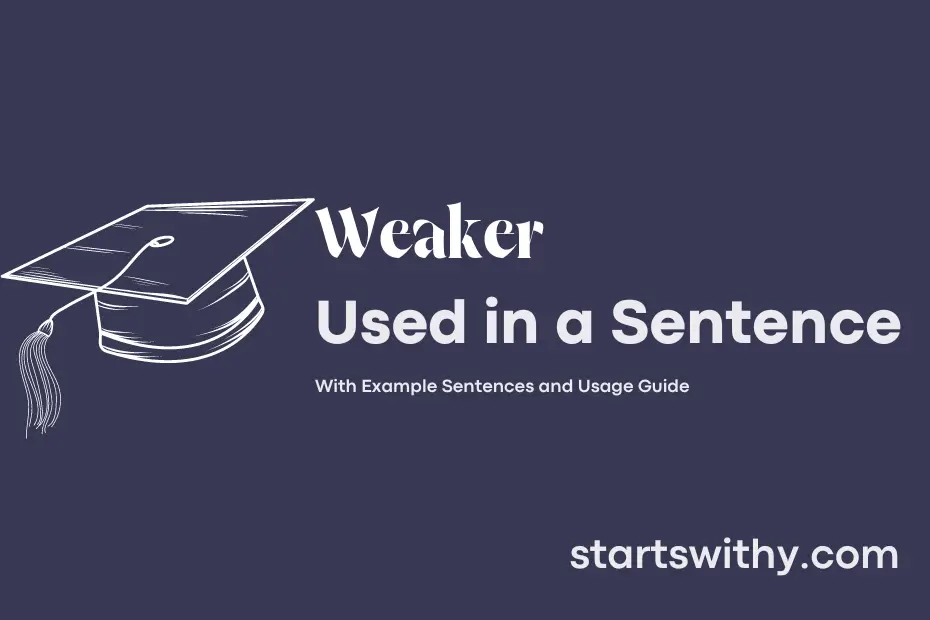When we want to compare two things and indicate that one is not as strong or powerful as the other, we use the word “weaker.” In English grammar, “weaker” is the comparative form of the adjective “weak,” highlighting a lesser degree of strength or effectiveness.
In sentences, “weaker” is used to express a comparative relationship, showing that one thing is less sturdy, forceful, or influential compared to another. This word is essential for making distinctions and drawing comparisons in various contexts, allowing us to convey nuances and differences in strength and capability.
7 Examples Of Weaker Used In a Sentence For Kids
- The baby bird is weaker than its mother.
- The pencil line gets weaker when it is not sharp.
- The little ant is weaker than the big elephant.
- The old grandpa’s eyes are getting weaker with age.
- The small plant looks weaker without water and sunlight.
- The slow turtle is weaker in running than the fast rabbit.
- The small flame looks weaker when the wind blows.
14 Sentences with Weaker Examples
- Weaker students may benefit from joining study groups to improve understanding of complex concepts.
- It is important to seek help from professors or tutors if you are feeling weaker in a particular subject.
- Developing strong time management skills can prevent weaker students from falling behind in their coursework.
- Finding a balance between academics and extracurricular activities is essential for preventing weaker performance in either area.
- Creating a study schedule can help weaker students stay organized and focused on their academic goals.
- Utilizing resources such as libraries, online databases, and study guides can be particularly helpful for weaker students.
- Participating in class discussions and asking questions can help weaker students better grasp course material.
- Forming study partnerships with classmates who excel in certain subjects can be beneficial for weaker students.
- Seeking feedback on assignments and exams can help weaker students identify areas for improvement.
- Attending review sessions and seeking clarification on challenging topics can help weaker students prepare for exams.
- Joining academic clubs or participating in competitions can provide weaker students with opportunities for growth and development.
- Engaging in regular exercise and maintaining a healthy diet can help weaker students improve their focus and concentration.
- Taking advantage of office hours to discuss course material with professors can be especially valuable for weaker students.
- Seeking out additional practice problems and resources for extra practice can help weaker students strengthen their understanding of key concepts.
How To Use Weaker in Sentences?
To use the word “weaker” in a sentence, you can follow these steps:
-
Understand the meaning of “weaker”: Weaker means having less physical or mental strength, less power, or being less effective than something else.
-
Identify a situation where you want to describe something as “weaker.” For example, if you want to compare two athletes and say that one has less strength than the other, you would use the word “weaker.”
-
Construct your sentence: Once you have identified the situation, create a sentence that includes the word “weaker.” For instance, “In the weightlifting competition, John’s opponent was weaker and couldn’t lift as much weight.”
-
Ensure proper grammar: Make sure your sentence is grammatically correct with the word “weaker” used appropriately in the context.
-
Practice using “weaker”: To get comfortable using the word “weaker,” try incorporating it into different sentences or scenarios. This will help you become more confident in using the word in various contexts.
Remember that using “weaker” in a sentence is simply a way to convey that something or someone has less strength, power, or effectiveness compared to another. Practice constructing sentences with “weaker” to improve your understanding and usage of the word in everyday language.
Conclusion
In reviewing various sentences with the keyword “weaker,” it becomes evident that these examples highlight a lack of strength or effectiveness in communication. Weak sentences often lack clarity, coherence, or impact, leading to confusion or disinterest in the reader. These sentences may be vague, lack supporting evidence, or fail to convey a strong argument or message.
To improve writing quality, it is crucial to identify and revise weaker sentences to ensure clear, concise, and compelling communication. Strengthening sentences involves enhancing structure, providing sufficient details, and ensuring a logical flow of ideas. By creating stronger sentences, writers can effectively convey their thoughts, engage readers, and enhance the overall quality of their work.



